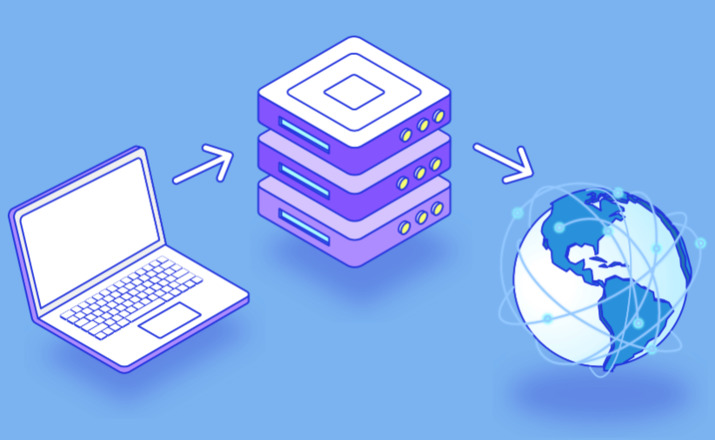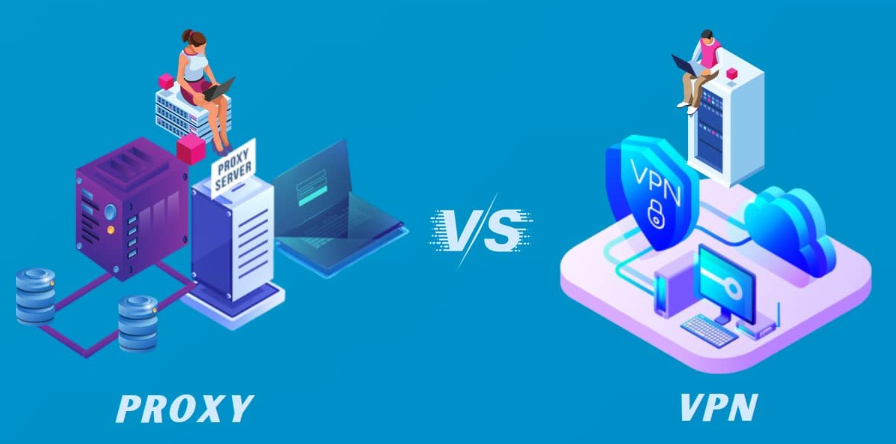How to Geek Best Proxy & VPN Providers
In today’s digital world, online privacy and security have become increasingly important. One way to protect yourself online is by using a proxy or a virtual private network (VPN). Both of these services allow you to browse the internet anonymously and securely by hiding your IP address and encrypting your internet connection.
However, not all proxy providers and VPNs are created equal. Some may offer better speeds, more locations, or stronger encryption than others. To help you find the best proxy providers and VPNs, we’ve compiled this guide.
What Is a Proxy Provider?

A proxy provider is a service that gives you access to a network of proxy servers. These servers act as intermediaries between the user’s device and the internet, allowing one to browse the web anonymously and access content that may be restricted in a particular location.
Types Of Proxy Providers
Proxy providers offer various types of proxies.
Free proxy services
Free proxies typically provide a limited number of servers and bandwidth. They may also display ads or collect user data. Apart from that, you might face slower connection speeds and less reliable uptime compared to paid solutions.
Paid proxy providers
Paid proxy providers are tailored for more versatile use cases, ensuring a bunch of options to fit user demands. Thus, you can benefit from the following:
- 1. High-quality proxies: faster, more reliable, and more secure compared with free options.
- 2. Dedicated proxies: exclusively used by one user. This ensures you have complete control over the proxy that is not shared with anyone else.
- 3. Multiple locations: allowing users to access content from different regions and bypass geo-restrictions.
- 4. IP rotation: implying you can switch between different IP addresses at regular intervals. This feature helps to avoid detection and maintain anonymity.
- 5. Customer support: ensuring users can address any issues promptly.
- 6. Compatibility: enabling seamless proxy usage with different applications and devices, including browsers, and smartphones.
- 7. Data encryption: maximum data protection when accessing sensitive information online.
Residential proxies
Residential proxies allow web surfing through IP addresses associated with real residential devices. Masking IPs or locations, and unblocking restricted websites or apps are among the most popular use cases.
Residential proxy providers typically offer a range of pricing plans and packages with various levels of access and support. Some services may boast additional features such as IP rotation, dedicated proxies, advanced data analytics, and reporting tools.
Datacenter proxy providers
In the heart of such a service, there’s always a server located in a data center – that’s where its name comes from. These proxies are typically faster and more reliable than their residential counterparts as they are not tied to a specific location or ISP.
Datacenter proxies typically abound with a range of proxy options, including dedicated and shared ones, as well as different IP addresses and geos. They may also offer features such as IP rotation, session management, and API integration. The main benefit of this proxy is enhanced anonymity.
Private proxy services
If you are looking for upgraded protection means, a private proxy may be your perfect fit.
Providing a private IP address, this solution ensures your online activity is hidden from their internet service provider (ISP) and other third-party entities. Private proxy services offer a range of features and benefits, including:
- 1. Anonymity,
- 2. Security,
- 3. Speed,
- 4. Location flexibility,
- 5. Customization.
What Is a VPN?

A VPN (Virtual Private Network) is a technology that ensures a secure and private connection to the Internet. By encrypting user data and routing it through a remote server, it hides IP addresses and locations, making it challenging to monitor your online activity or access sensitive personal information. VPNs are commonly used for privacy, security, and accessing geo-restricted content or websites, providing an ideal solution for travelers who want to stay connected while away from home.
Recent studies have shown that over 30% of internet users now have a VPN to protect their data, with this number expected to increase as more people become aware of its benefits. Additionally, companies are now providing employees with secure corporate networks via VPNs as remote working gains traction.
Types of VPNs
Remote Access VPN
One of the most significant benefits of remote access VPN is its ability to ensure secure connections between remote workers and the company’s network. This is achieved by encrypting all data transmitted between the user’s device and the company’s network, preventing any unauthorized access or interception of sensitive data.
Remote access VPN can be configured to access different types of devices, including laptops, smartphones, and tablets. This flexibility allows employees to work from any device, regardless of the operating system, without compromising security.
Site-to-Site VPN
Site-to-Site VPN enables organizations to securely connect multiple offices, data centers, or cloud environments and establish a secure private network that allows for the exchange of sensitive data. This service is typically used by large corporations with multiple locations, where secure communication between different networks is essential. For example, a financial institution with branches in different cities or countries can use Site-to-Site VPN to connect all its branches and ensure secure communication between them.
Site-to-Site VPN sets the stage for centralized control and management of the network, making it easier for IT administrators to coordinate network traffic.
Cloud VPN
Cloud VPN allows users to securely access resources on a cloud-based network. It is often employed by organizations that handle cloud-based services, such as Software as a Service (SaaS), Platform as a Service (PaaS), and Infrastructure as a Service (IaaS). For example, a company using cloud-based services such as Microsoft Azure or Amazon Web Services (AWS) can leverage Cloud VPN to securely access its resources on the cloud-based network from anywhere in the world.
This solution eliminates the need for dedicated hardware or infrastructure for VPN services. Instead, Cloud VPN can be deployed as a cloud-based service, reducing the cost and complexity of VPN deployment and management. Besides, it has such features as load balancing, high availability, and automatic failover, which can improve the reliability and availability of VPN services.
Mobile VPN
This type of VPN ensures secure and private connection for mobile devices such as smartphones and tablets. They encrypt all internet traffic to protect users’ data and privacy while using public Wi-Fi networks or cellular data. Like other VPNs, mobile ones are tailored to access geo-restricted content and websites that may be blocked in certain regions. Some mobile VPN providers offer additional features such as ad blocking, malware protection, and automatic Wi-Fi protection.
Free VPN
Free VPNs provide the same service as paid options but without paying a fee. They typically offer limited features and bandwidth and may display ads or sell user data to generate revenue. Free VPNs may also have slower connection speeds and less reliable service than paid options.
Paid VPN
Paid VPN providers can boast a range of features and benefits, including:
- 1. Enhanced security: advanced encryption protocols and security features to protect your online activities from prying eyes.
- 2. Faster speeds: faster servers and more bandwidth, allowing for smoother and faster connections.
- 3. More server options: more server locations and options compared with free VPNs, giving you more flexibility and options to choose from.
- 4. Customer support: dedicated customer support to help you troubleshoot any issues or concerns you may have.
- 5. No logging: no logs or personal information storage, ensuring your privacy and anonymity online.
- 6. Compatibility: compatible with a wider range of devices and operating systems, including smartphones, routers, and gaming consoles.
- 7. Ad blocking: Some VPNs even offer ad-blocking features to reduce the number of ads you see online, improving your browsing experience.
Difference Between A Proxy Provider And A VPN

A proxy provider and a VPN are two different types of services that serve different purposes, although they are often used interchangeably. The main difference between a proxy provider and a VPN is the level of security and privacy they offer.
A proxy provider acts as an intermediary, masking an IP address and providing access to websites and online content that may be restricted. However, it does not encrypt internet traffic, meaning personal information can still be accessed by third parties.
On the other hand, a VPN creates a secure, encrypted connection between the user and the server. This makes it barely possible to intercept or access the user’s personal info.
Another key difference between a proxy and a VPN is the level of anonymity. While a proxy provider can mask the user’s IP, it does not provide complete anonymity, as your browsing can still be tracked. In contrast, a VPN is tailored for these purposes. In terms of performance, proxies are generally faster than VPNs because they do not encrypt internet traffic. However, this increased speed comes at the cost of decreased security and privacy.
Factors To Consider When Choosing A Proxy Provider Or VPN
- 1. Security: a proxy provider or VPN should offer high-level security features such as encryption, firewalls, and malware protection to ensure that you are safe online.
- 2. Privacy: a strict no-logs policy is a guarantee of your online activities remain private.
- 3. Speed: a service should offer fast connection speeds to avoid any mishaps.
- 4. Server locations: a good provider always offers a wide range of server locations to maximize your chance of accessing geo-restricted content from different regions.
- 5. Compatibility: your perfect fit is compatible with different devices and operating systems to satisfy your browsing demands.
- 6. Customer support: great, if you can access it 24/7 to make sure they are able to address any issues as they arise.
- 7. Price: competitive pricing and flexible payment options are a sign that you will get value for your money.
- 8. Reputation: a good reputation in the industry and positive reviews from other users will save you from a scam service.
A Step-By-Step Guide On How To Choose The Best Proxy Provider And VPN

- 1. Determine your needs: First, you need to understand why you need a proxy or VPN, what type of activities you will be doing, etc. This will help you identify what features are most important to you.
- 2. Research providers: Once you know your needs, start your research. Look for providers that have a good reputation, are reliable, and have been in the business for a while.
- 3. Check the location of servers: examine the location of the servers provided by the proxy or VPN. If you require access to websites or content from a particular region, ensure that the provider has servers situated in that region. Additionally, if the provider has servers available in multiple countries, you have more flexibility.
- 4. Find out the number of servers: The more servers a proxy or VPN has, the better. This is because it will give you more options for connectivity and will guarantee the server is not overloaded.
- 5. Verify the protocols: Make sure a service supports the protocols that you need. This includes OpenVPN, L2TP/IPsec, PPTP, etc.
- 6. Compare prices: Take a look at the prices of different providers to ensure that you are receiving excellent value for your investment. Additionally, seek out any discounts or special promotions that may be available.
- 7. Evaluate encryption levels: Ensure that you check the encryption levels that the provider offers, as this will affect the security of your data. The higher the encryption level, the more secure your information will be.
- 8. Explore additional features: Look for any extra perks the service may offer, such as ad blocking, malware protection, or anonymous browsing. These features can enhance your overall experience.
- 9. Read user reviews: They will help you obtain a more comprehensive understanding of the service’s quality and support along with a clear picture of what to anticipate from the provider.
Conclusion
In summary, locating the optimal proxy and VPN providers can be an intimidating process, but it is crucial to guarantee your online privacy and security. Check more guides on ProxyBros to facilitate your way toward your perfect solution.
Remember to take into account aspects such as speed, security, privacy, and customer support when making your final decision. With the right proxy or VPN provider, you can experience a secure and protected online environment.
